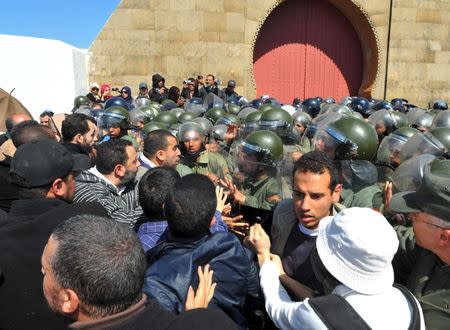Moroccan opposition in rare standoff with police over burial
RABAT (Reuters) - Thousands of supporters of Morocco's biggest opposition movement buried their late leader's widow on Thursday after a standoff with security forces who tried to prevent her being laid to rest beside his grave. It was one of the biggest shows of defiance by the Islamist movement Justice and Spirituality, or Al-Adl Wal-Ihssan, since it became a major player in 2011 protests that forced limited political reforms in the North African kingdom. Abdessalam Yassine, who died in 2013, formed the group in 1981. It is banned from formal politics, but is believed by analysts and diplomats to be the only opposition organization capable of mass mobilization in Morocco. Moroccan police forces attacked a first group of mourners preparing the grave of Khadija al-Maliki, Yassine's widow, injuring some of them, said one of the group's leaders, Hassan Bennajeh. "We contacted authorities yesterday when she died and they said there was no problem to bury her beside her husband," Bennajeh said. "But this morning, they came, destroyed the grave and said it was not conforming to the rules" he added. Bennajeh said authorities proposed another grave far from where Yassine is buried. Thousands of other mourners who arrived with al-Maliki's body stood outside the cemetery in Rabat chanting religious slogans while dozens of riot police blocked the main gate, a Reuters reporter said. After two hours, authorities opened the doors and let the mourners inside the cemetery. Morocco's government spokesman and the interior ministry did not answer calls seeking comment. "It was a disagreement about burial customs, but it has been resolved now," a source from the local authorities said. Justice and Spirituality stands apart from the other main Islamist party, Justice and Development(PJD), which was formed in the late 1990s and won elections in 2011 that were part of the King's efforts to end a protest movement. That year, facing a wave of uprisings and protests for reforms at home, King Mohammed approved a new constitution devolving some of his powers to parliament and the government. With limited reforms, heavier public spending and tough state security measures, Morocco managed to calm the protests, but the king also retained his grip on security, the army and religion. (Reporting by Aziz El Yaakoubi; Editing by Mark Trevelyan)

 Yahoo News
Yahoo News 


